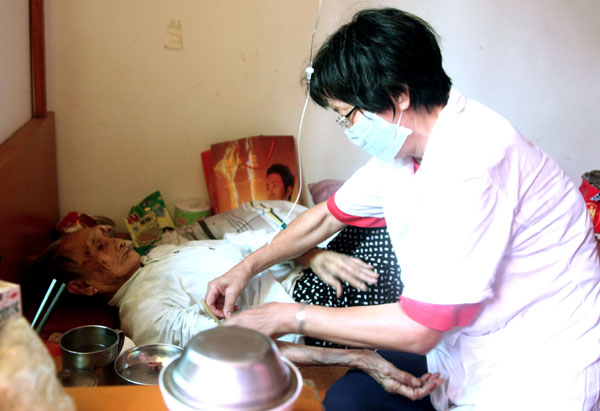The new temples of a twilight age
Updated: 2013-12-27 08:51
By Sun Li in Shaxian, Fujian province and Zheng Jinran in Yanjiao, Hebei province (China Daily)
|
|||||||||||
|
|
In China, care of the elderly is shifting its focus from the physical to the spiritual, report Sun Li in Shaxian, Fujian province and Zheng Jinran in Yanjiao, Hebei province.
Guan Hehua never imagined that a visit to Jixiang Temple in Shaxian county, Fujian province, would result in her bidding farewell to normal family life and moving to the temple to live with 100 other seniors.
"The easy access to Buddhist sutras and daily prayers allows elderly people like me to find inner peace, which we were not able to achieve at home," said the 78-year-old who began living at the temple in 2010 and is the only Buddhist in her family.
Situated on a verdant mountain and nurtured by fresh springs, Jixiang Temple is the first and so far only temple in Fujian to operate as a nursing home. Although 120 beds are available, there are only 100 senior residents, whose ages range from 71 to 102. The accommodation is shared, with two or three people to each 10 to 15-square-meter room equipped with an air conditioner, a private toilet and a hot water boiler.
To enable the residents to look after each other, comparative youngsters are paired with older inhabitants, according to Shi Nengqing, 77, a senior nun who acts as the nursing home's administrator.
Before moving to the temple, Guan lived alone in the county of Shaxian because her sons had moved away on business. She described the temple as "heaven", and said she can immerse herself in Buddhism while her sons are confident in the knowledge that she's being cared for correctly.
Yin Suqing, a 78-year-old who moved to the home in 2008, expressed her satisfaction with life at the temple. "Before I moved in, I dared not perform morning prayers. Although my family supported my religious beliefs, I was worried I would disturb them," she said.
Shi said most of the residents are Buddhists who are pursuing inner peace in later life and gaining a spiritual satisfaction the material world can't provide.
Neighboring provinces, such as Zhejiang and Jiangsu, are home to at least 21 temples-cum-nursing homes. Although they mainly provide accommodation for Buddhists, they are also home to many elderly non-believers, according to the statistics of State Administration of Religious Affairs.
Other provinces, such as Sichuan and Shanxi, will adopt a similar model in the future.
Today's Top News
Anger over Abe's World War II shrine visit
'An overall view' on Mao required
Factories halted to clear air in Beijing
China's urbanization rate to hit 60% by 2018
Foreign patients treated like natives
Couples who lose a child to receive higher subsidies
Arafat died of natural causes: Russia
Turk PM announces major cabinet reshuffle
Hot Topics
Lunar probe , China growth forecasts, Emission rules get tougher, China seen through 'colored lens', International board,
Editor's Picks
|

|

|

|

|

|






